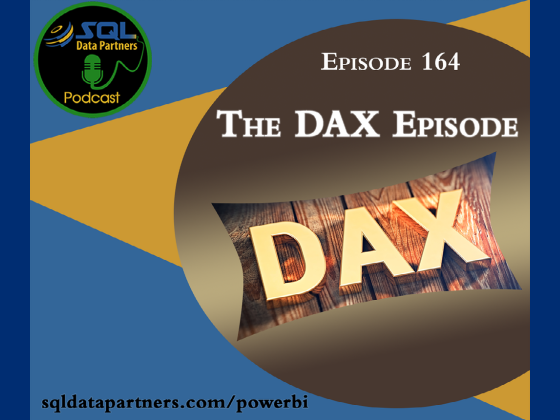The DAX Episode
DAX is the acronym for Data Analysis Expressions, and it is the formula language used throughout Power BI. In this episode we talk about DAX concepts and how they are simple and straightforward, but can be confusing for those coming from a relational database background. DAX uses some unique programming concepts and patterns which can make it difficult to fully use and understand. We talk about some experiences getting started with this language and ideas on how you can get started.
Episode Quotes
“There’s a couple different aha moments. I think two of the biggest ones is one, DAX and the VertiPaq engine [behind it] is a columnar storage engine, not a row storage engine, and then the other piece is these evaluation contexts that basically affect what your expression can see.”
“I really recommend buying a book or watching my course, because if you try to learn DAX just adhoc, like you might SQL, you’re just going to keep banging your head against walls as you go along, so it’s simple, but not easy.”
“There’s two ways of encapsulating business logic in DAX and they look really, really similar, but they’re very different in how they function.”
“If you can understand measures and you can understand evaluation contexts, that’s going to take you most of the way.”
Listen to Learn
00:38 Intro to the team & topic
01:38 DAX is simple but not easy – don’t try to figure it out without help
04:39 Two ways of encapsulating business logic in DAX
07:36 Are we talking language or architecture?
08:32 Not using the formula bar is a pitfall for Power Query, what about DAX?
11:01 Some of the dividing lines in when and how to use DAX
14:31 DAX is a columnar engine and what comes because of that
17:37 A good approach to DAX if you’re coming from a SQL background
20:27 Who is going to be interested in starting to learn and use DAX?
21:56 What DAX can do for the database administrator, specifically
24:14 Closing Thoughts
Meet the Hosts

Carlos Chacon
With more than 10 years of working with SQL Server, Carlos helps businesses ensure their SQL Server environments meet their users’ expectations. He can provide insights on performance, migrations, and disaster recovery. He is also active in the SQL Server community and regularly speaks at user group meetings and conferences. He helps support the free database monitoring tool found at databasehealth.com and provides training through SQL Trail events.

Eugene Meidinger
Eugene works as an independent BI consultant and Pluralsight author, specializing in Power BI and the Azure Data Platform. He has been working with data for over 8 years and speaks regularly at user groups and conferences. He also helps run the GroupBy online conference.

Kevin Feasel
Kevin is a Microsoft Data Platform MVP and proprietor of Catallaxy Services, LLC, where he specializes in T-SQL development, machine learning, and pulling rabbits out of hats on demand. He is the lead contributor to Curated SQL, president of the Triangle Area SQL Server Users Group, and author of the books PolyBase Revealed (Apress, 2020) and Finding Ghosts in Your Data: Anomaly Detection Techniques with Examples in Python (Apress, 2022). A resident of Durham, North Carolina, he can be found cycling the trails along the triangle whenever the weather's nice enough.
Want to Submit Some Feedback?
Did we miss something or not quite get it right? Want to be a guest or suggest a guest/topic for the podcast?
